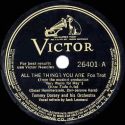VARIOUS ARTISTS
All the Things You Are
Ten versions
Oh, I coulda picked 20 or 30, there are so many great recordings of this oft-played standard by Jerome Kern and Oscar Hammerstein II, which is from the 1939 musical Very Warm for May.
The intro appears in #3, 4, 9 and 10. Probably written by Bird or Diz, so as to have something prior to diving into the tune.
This ingenious composition relies on a constant shuffle of secondary dominants. Right after the first tonic, Kern spins a vi/ii/V/I to D-Flat Major, then again vi/ii/v/I to E-Flat Major. Then G Major, E Major, and finally A-Flat Major, the parallel tonic, before dropping a semitone to introduce ii/V back to the original tonic, F Minor..
Dorsey’s warm tone and a beautifully filled-in arrangement sets up Leonard’s vocal, with Dorsey playing behind him with a mute.
2. Frank Sinatra (1945)
Ken Lane Singers
(3:03)
Towards the end, he takes it up a half-step and finishes on a high G-Flat!
A nice intro, which both Bird and Dizzy use, as well as Scofield and Mehldau (below). Bird plays the head with lots of little flourishes, but never loses the melodic line. Miles solos first, muted. Jordan goes next, back to Miles and Bird together; they finish with the intro music …
Gillespie plays the head with a mute. Bird takes the B section. Stewart takes over, bowed, followed by Hart, Paparelli (B section); then Dizzy returns, followed by the intro as ending.
At a very relaxed tempo, Tatum begins alone for two choruses, then the breathy Webster blows through the wind (what a sound!) … Tatum returns with some soulful improvisation — when Webster pops back in, Tatum is in full 88-key accompaniment!
6. Ella Fitzgerald (1963)
(3:19)
Nelson Riddle arrangement. Ella sings it pretty straight, but what pure vocal tone! Riddle writes out a softly fading finish.
7. Oscar Peterson (1970)
OP, piano
George Mraz, bass
Ray Price, drums
(6:10)
A little Latin tinge. Peterson plays bunch of cool substitutions in the head, and the he’s off and running, bopping around the changes, but without ever covering up the harmonies. He also runs the gamut with dynamics — smashing octaves melting into superb quiet coolness.
He finishes the tune playing over a two-bar riff (Fm7/Bbm7) …
8. Tommy Flanagan (1978)
TF, piano
Keeter Betts, bass
Jimmy Smith, drums
(5:57)
Live at Carnegie Hall. Flanagan’s solo alternates between strong block chords and high-wire ripplings. An amazing pianist.
9. John Scofield (1988)
JS, guitar
Anthony Cox, bass
Terry Lynne Carrington, drums
(7:40)
Scofield (electric guitar) runs through the head by himself, barely touching the melody until the turnaround. He plucks out notes from the chord structure like he’s catching raindrops.
Carrington is one my favorite drummers. She’s like Elvin or Tony Williams — keeping time while punching all kinds of offbeats and cymbals crashing — without ever getting in Scofield’s way.
Cox takes a beautiful solo, Carrington’s brush work keeping things crisp, while Scofield comps, then gradually returns, again just touching the melodic outline. He then switches things up and finishes the tune with the Phrygian Parker intro.
10. Brad Mehldau (1999)
BM, piano
Larry Grenadier, bass
Jorge Rossy, drums
(13:44)
Live at the Village Vanguard.
Mehldau plays by himself, jerkily circling around the melody/harmony, with both hands syncopating — resulting in a cloud of rhythmic uncertainty. It’s captivating.
The bass and drums join in around the two-minute mark. Grenadier’s solo is also heavily syncopated — but this band always knows where one is!
Mehldau also introduces the Parker intro, over which Rossy solos.
One of the truly great talents of our day.
Go to Source
Author: Lewis Saul
